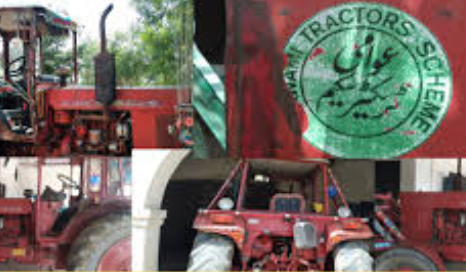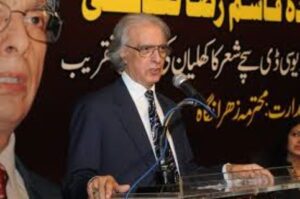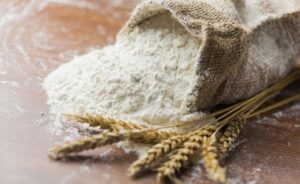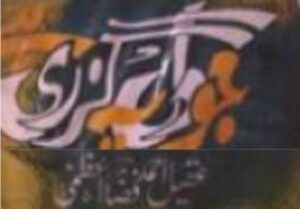An insight into the Awami Tractors Scheme: Will the marginalized benefits?

By Shahid Rizvi
How much pious would be the intentions of the Prime Minister is announcing in October 1994 the Awami Tractor Scheme, the project has been a glaring example of government functionaries and their henchmen making hey at the cost of public finance and interest. Sponsored and financed by the Agricultural Development Bank of Pakistan (ADBP), the 18 billion rupees massive scheme has badly failed and totally collapsed due to monumental bung bengs.
The scheme envisaged distribution of 50 HP tractors to small farmers holding farms preferably from 20-25 hectares in installments of 10 years at a price of Rs. 1,50,000 with a down payment of Rs. 20,000. The total number of tractors meant for distribution in four years was 120,000. Four points-Hyderabad, Quetta, Lahore and Peshawar were spotted for a quota of 35,000 tractors each year for distribution. All tractors were to be imported tax and duty-free. The price of the tractor was kept at the lowest i.e. Rs. 1,50,000 which is half the price in Pakistani open market of the same make.
The aim of the scheme was to help the small farmer who is badly handicapped due to non-mechanized farming. The efficiency and productivity of manual labor in comparison to tractor is very low. Energy and time are also much more consumed for the same sort of work. Moreover, tractors give extra units of labor as loading and transporting vehicles. Besides, mechanized farming has a very deep rooted and vast influence on the economic, social and political structure of rural society.
The first lot of 4.000 tractors was received in February 1995 at Port Qasim. These were Belarus MTZ-50 and Ursus 2812. The problem started when the Ministry of Finance who had release the funds, conducted inspections of the lot and declared the whole lot as a junk as reportedly said by Secretary, Ministry of Finance. Only 212 out of 1022 Belarus MTZ-50 and 160 out of 1064 Ursus-2812 were cleared for delivery.
According to official sources, the tractor received has serious defects and discrepancies. They are sub-standard in finishing, different parts of the tractor, have different paints, appropriate make of tires in absent, fuel tanks are different, speedometers are missing, and even logos are not in place.
The report of the Ministry of Finance was to be submitted to the Economic Coordination Council of the cabinet but was way laid on the interference of the Ministry of Agriculture, who delivered a speech in favor of imported tractors.
THE NEWS of April 21, 1995, reported that in the summary presented to ECC, the Ministry of Finance termed ATS as a financial disaster and showed concern over ADBP financial crunch.
The summary recommended that ATS should be abandoned or completely reviewed. “Minister for Food, according to sources hinting at close relationship with one importer included in ATS, expressed his full satisfaction over the quality.” It was expected that ECC will revoke the contract with foreign suppliers and keeping in view the indefinite delays in the delivery and substandard quality, will claim damages.
The Minister for Food and Agriculture denied that the tractors are substandard and that he was fully satisfied with the equipment standard, a sample of which has been kept at Islamabad. The like statement was given by Chairman ADBP who said that eight teams were formed to check the standard of tractors.
Another inspection team from Ministry of Agriculture was appointed who after inspection declared the whole lot as fit for delivery. The report was submitted to ECC who declared it satisfactory.
But the controversy remained there as the local assemblers made a hue and cry against not including them in the plans, and after inspection declared imported lots as defective and unfit.
The government announced that if the local manufacturers fixed prices of their tractors at Rs. 150,000 they can enter the plan and their tractors will be purchased under ATS. Chairman ADBP in this connection announced that 54,000 tractors will be distributed by ADBP out of which 18000 tractors will be locally manufactured units, 20,000, imported tractors under ATS and 16,000 tractors will be provided under the normal loading scheme of ADBP.
The distribution of imported tractors was delayed and could not take place according to schedule.
Owing to the objection on quality of imported tractors and local assemblers demand, government included from time to time many makes branding them so locally manufactured. These included universal (local market price Rs 2,35,000), Steveyer-8043 (Rs. 1,96,000), Belarus (Rs. 2,00,000), Ursus-3172 (Rs. 2,37,000). These were inducted as locally manufactured without ascertaining whether these are locally produced or not. It was also announced that Russian-LTZ and Chinese Jing Su at Rs. 1,37,000 will also be considered afterwards. It was not known why China was contacted for its offer of Jing Su at Rs. 1,37,000 which was less than the imported Belarus and Usrus price, despite the fact that Chinese offer was already on record before the announcement of the scheme.
The local manufacturers were asked to give quotation for their tractor with the condition that their prices should remain within the range of Rs.1,50,000, for which purpose government allowed exemption from duties and taxes to local industry.
Government simultaneously announced that those farmers who had originally applied for tractors but remained out of the ballot for 35,000 tractors, should now apply to convert, their application for locally manufactured tractors at the same price and condition. Some 55,000 farmers applied for conversion. It was later announced by the ADBP that these farmers can withdraw their token money.
In the list of local tractors, the government included four such tractors which have no assembly plant in Pakistan.
The local manufacturers refused to accept the terms of the government and to provide tractors at a cost of Rs. 1,50,000 even with the exemption and duties. The prices quoted by local manufacturers were in the range of rupees two to three lacs.
Only MF and FIAT have an assembly plant, a dealer network all over Pakistan and manufacture 85 percent of components locally, while other makes are imported. While imported Belarus-MTZ-50 and Ursus-2812 are priced Rs. 1,50,000, the locally manufactured are quoted at Rs.2,00,000 and Rs. 2,37,000 respectively.
A dealer when asked as to how Ursus, Stevyer or universal will be assembled in Pakistan without an assembly line, said “anything can be done in Pakistan with proper connections and speed money. ADBP has very blindly included these tractors as locally manufactured without ascertaining that they have no assembly line in Pakistan.”
‘These tractors can only be smuggled almost as built up with false declaration,’ he further said, ‘It takes at least five years to achieve a local content of 65 percent, dies of sheet metal alone take two years to get ready, patterns for casting take two years, gear taken any longer,’ and confirmed that no immediate arrangement can be made to locally manufacture these tractors.
Minister for Food said that the local manufacturers were finding it difficult to lower the price of their tractors because the vendor industry was not developed. He said that some of the local manufacturers have lowered their price but are still offering in the range of Rs. 1,95,000 to 2,00,000.
During the seventh five-year plan 82,900 tractors were inducted against a target of 1,46,000 tractors i.e. a shortfall of 50 percent. The operational fleet from 1992-93 was 2,24,000 tractors. The sales of 1,51,200 tractors has been envisaged during the Eight Five Year Plan which has been launched with one year’s delay, and the total number of tractors is expected to increase to 2,41.6000 in 1997-98.
Local manufacturers must provide 10,000 tractors in the current year under the regular loaning scheme of ADBP. Millat tractors has a booking of 5000 and FIAT has to provide 3000 units.
Under ATS five organizations have been recognized as local manufacturers i.e. Millat tractors (Messay Fergusan), Al Ghazi tractors (FIAT), Belarus, Ford and Universal.
According to Chairman PAAPAM (Pakistan Association of Automotive and Accessories Manufacturers), it was agreed by government in principal that whatever concessions were available to imported tractors under ATS, the same would also be available to local assemblers, manufacturers and vendors, but so far only import of raw material without duty was allowed. Other recommendations of PAAPAM to bring local industry at par with imports were:
- Supply of locally produced raw material by Pakistan Steel at for price on regular basis.
- Duty free import of cutting tools/jigs/fixtures and any production material, in addition to duty free import of raw material.
- Same credit facility for local tractor manufacture by ADBP as extended for import of CBU tractors under ATS.
- Exemption from deduction of withholding income tax at 2.5 percent.
- Local manufacturers and vendors should be assured order 4000 tractors per year under ATS.
- Procedure for import of raw material and components/subcomponents be simplified.
The vendor offers reductions of five percent in the prices of their products and consequently, local assemblers quote their prices based on their reduction.
Vendors however cannot honor their commitment unless all the above concessions were allowed to them, according to Chairman PAAPAM.
As reported by THE NEWS of April 21, 1995, the representative of local assemblers refused to take dictation from the Ministry of Industries on the price reduction or deletion program, rolling back. Local assemblers have backed out from providing cost effective tractors saying that rolling back of deletion program which was allowed to local assemblers was set to ruin the whole tractor vending industry.
In meeting local assemblers were asked to exclude the parts manufactured by Pakistan Machine Tool Factory (PMTF) to which assemblers sharply reacted. They said that in case of PMTF exemption they would not participate in the scheme as the tractor’s parts produced by PMTF i.e. gear etc., crown wheel etc., were the most expensive and only their import could provide them with any price relief. Assemblers said other vendors Allwin, Thermex Agri Auto, General Tyres, Baluchistan Wheels, Tawakkul Group, Ravi Autos, CIBA Enterprises and Excell Engineering will also approach government for exemption.
Chairman State Engineering Corporation was extremely critical of the decision to wrap up the deletion program.
If the Ministry of Industries did not accept the decision given by the Social Assistant to the Prime Minister in which the local assemblers were allowed to roll back their deletion program to 65 percent, the whole ATS and induction of local assemblers into the scheme would end up in a blind corner.
In this whole episode, the role played by different characters is dubious, which calls for clarifications.
It is not understood why the scheme was announced without any homework, without ascertaining the competitive position of tractors in the world market and without taking into account which tractors are effective and low cost.
It is not known why ADBP took such a hasty and out-of-the-way decision as calling for applications from the farmers without even prior approach of the scheme as reported in the newspapers. It was also not clear how and why an agreement with foreign suppliers was signed and letters of credit opened. ADBP also did not reportedly confirmed with the suppliers of Belarus-MTZ 50 and Usrus 2812 that they will be able to meet the delivery schedules as evident from the extension sought by suppliers and even then, not meeting the commitment. As reported, ADBP also ignored the fact that suppliers did not meet pre-condition of the agreement. The role of the Ministry of Agriculture and ADBP in defending the defective and sub-standard tractors is also not clear. It was strange that that ADBP and Ministries of Agriculture and Industries announced inclusion of Universal, Steyever and other tractors as “locally manufactured” knowing well that tractors have no assembly line in Pakistan. More objectionable is the assertion of assemblers that they will provide these as locally manufactured tractors although they could not make local components even 5 percent.
The scheme has now been transferred to “cash payment only” providing tractors at Rs.150,000 per unit but still seems in jeopardy because local make is not available at Rs. 150,000. The purpose of the scheme has already failed.








